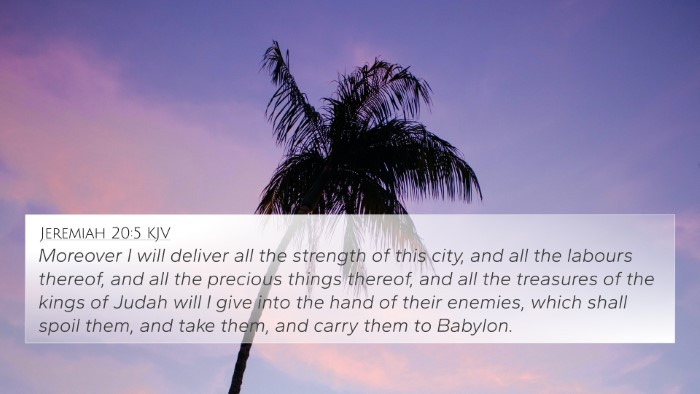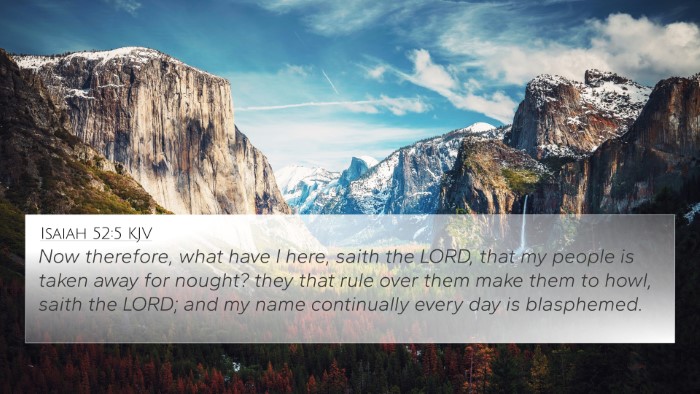Understanding Jeremiah 15:13
This commentary seeks to provide a comprehensive insight into Jeremiah 15:13, utilizing reputable public domain commentaries such as those by Matthew Henry, Albert Barnes, and Adam Clarke. The purpose is to deepen the understanding of this biblical verse and its implications.
Verse Text
Jeremiah 15:13 (KJV): "Thy substance and thy treasures will I give to the spoil without price, and that for all thy sins, even in all thy borders."
Analysis of Jeremiah 15:13
Jeremiah 15:13 speaks profoundly about the consequences of sin and disobedience against God. The prophet Jeremiah addresses the impending judgment and loss that will befall Jerusalem due to the people's transgressions. The verse highlights God’s sovereignty and the devastating impact of sin upon the nation.
Contextual Background
This verse emerges from a broader narrative where God communicates His judgments through Jeremiah. The Israelites, having turned away from God, are warned about the repercussions of their actions.
Commentary Insights
- Matthew Henry: Henry elaborates on the idea that the treasures of Jerusalem, which the people cherished, would be taken as a punishment. This emphasizes the severity of sin and the justice of God in permitting loss as a consequence of disobedience.
- Albert Barnes: Barnes points out that the treasures of Jerusalem not only refer to material wealth but also to spiritual integrity and divine favor, both of which would be stripped away as judgment for their sinful actions.
- Adam Clarke: Clarke emphasizes the metaphorical and literal implications of spoil as a means of illustrating the loss suffered by a nation that turns its back on God. The despair expressed by Jeremiah underlines the depth of sorrow for the people’s fate.
Thematic Connections
This verse connects deeply with various themes within the Bible, illustrating the recurring motif of judgment, mercy, and restoration. Through cross-referencing, we can find several other verses that resonate with the implications of Jeremiah 15:13.
Related Bible Cross References
- Isaiah 39:6-7: Predicts the Babylonian conquest of Jerusalem, affirming the prophecy of loss and dismay for the people of Israel.
- Lamentations 1:7: Reflects on the consequences of sin, as the city mourns her losses and recognizes her transgressions.
- Ezekiel 7:19: Addresses the futility of relying on wealth in times of judgment, underscoring the lesson that material possessions cannot save them.
- Jeremiah 17:3: Warns of the consequences of idolatry, indicating the loss of treasures as part of God's judgment.
- Hosea 4:7: Highlights the connection between sin and destruction, echoing the message of loss due to transgression.
- 2 Chronicles 36:17-19: Chronicles the fall of Jerusalem and serves as a historical account of the prophecies made by Jeremiah.
- Proverbs 11:4: Stresses that riches gained unjustly will not deliver in the day of wrath, reinforcing the themes present in Jeremiah 15:13.
The Importance of Cross-Referencing
Understanding the connections between Bible verses, such as Jeremiah 15:13, enhances our grasp of biblical themes. Cross-referencing not only serves as a tool for deeper study but also enriches our study of the Scriptures. Tools like a Bible concordance or a cross-reference Bible study guide can facilitate this exploration.
Benefits of Cross-Referencing Biblical Texts
- Provides a framework for understanding thematic overlaps.
- Offers insight into how different books of the Bible dialogue with one another.
- Helps in identifying biblical principles applicable to modern life.
Concluding Thoughts
Jeremiah 15:13 serves as a poignant reminder of the serious consequences of turning away from God. Through this analysis and the connection with other scripture passages, we gain a fuller understanding of God's character in relation to humanity's choices. As we engage with the text, may we seek to apply its lessons to our lives, recognizing the importance of righteousness and the impact of sin.








